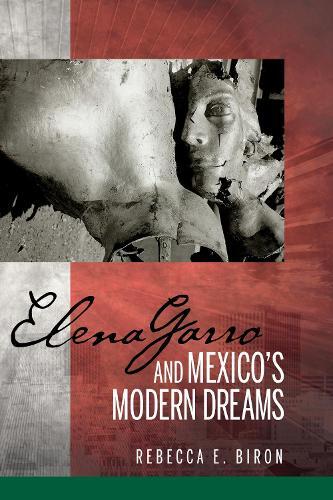Overview
Elena Garro and Mexico's Modern Dreams uses Elena Garro’s eccentric life and work as a lens through which to examine mid-twentieth-century Mexican intellectuals' desire to reconcile mexicanidad with modernidad. The famously scandalous first wife of Nobel Prize winner poet Octavio Paz, and an award-winning author in her own right, Garro constructed a mysterious and often contradictory persona through her very public participation in Mexican political conflicts. Herself an anxious and contentious Mexican writer, Elena Garro elicited profound political and aesthetic anxiety in her Mexican readers. She confused the personal and the public in her creative fictions as well as in her vision of Mexican modernity. This violation of key distinctions rendered her largely illegible to her contemporaries. That illegibility serves as a symptom of unacknowledged desires that motivate twentieth-century views of national modernity. Taken together, Garro's public persona and critical perspective expose the anxieties regarding ethnicity, gender, economic class, and professional identity that define Mexican modernity. Blending cultural studies and detailed literary analysis with political and intellectual history, Mexico's Modern Dreams argues that, in addition to the intriguing gossip she elicited in literary and political circles, Garro produced a radical critique of Mexican modernity. Her critique applies as well to the nation's twenty-first-century crisis of globalization, state power, and pervasive violence.
Full Product Details
Author: Rebecca E. Biron
Publisher: Bucknell University Press
Imprint: Bucknell University Press
Dimensions:
Width: 16.20cm
, Height: 2.50cm
, Length: 23.70cm
Weight: 0.540kg
ISBN: 9781611484700
ISBN 10: 1611484707
Pages: 294
Publication Date: 14 December 2012
Audience:
College/higher education
,
Postgraduate, Research & Scholarly
Format: Hardback
Publisher's Status: Active
Availability: In Print

This item will be ordered in for you from one of our suppliers. Upon receipt, we will promptly dispatch it out to you. For in store availability, please contact us.
Reviews
This engaging, readable book by Biron examines Elena Garro's personal and literary relationships, maintaining that readers often find the writer illegible due to her contradictory and controversial public interventions. Biron examines Garro's creative work as well as her journalism and interviews to give a more coherent portrait. The chapter on Critical Confrontations describes key events that have triggered the discomfort surrounding Garro: the aftermath of the 1968 student massacre at Tlatelolco, when she was accused of naming intellectuals as co-conspirators; an incident in 1965 when Garro championed the rights of dispossessed campesinos by staging a sit-in at a writers' conference; and, more bizarrely, Garro's involvement in the JFK assassination investigation. The author examines Garro's conflicting statements about her identification with feminism, magical realism, and communism, and manages to trace a coherent line in these seemingly erratic and arbitrary pronouncements. Biron helpfully locates the influence of French personalism in Garro's work and life, underscoring her commitment to the individual and idiosyncratic over the collective and imitative. A thought-provoking text that shows how this important Mexican author fits within the literary history of the twentieth century, and that joins other explorations like Sandra Messinger Cypess's Uncivil Wars Summing Up: Highly recommended. Lower-division undergraduates through faculty; general readers. * CHOICE *
This engaging, readable book by Biron (Dartmouth College) examines Elena Garro's personal and literary relationships, maintaining that readers often find the writer illegible due to her contradictory and controversial public interventions. Biron examines Garro's creative work as well as her journalism and interviews to give a more coherent portrait. The chapter on Critical Confrontations describes key events that have triggered the discomfort surrounding Garro: the aftermath of the 1968 student massacre at Tlatelolco, when she was accused of naming intellectuals as co-conspirators; an incident in 1965 when Garro championed the rights of dispossessed campesinos by staging a sit-in at a writers' conference; and, more bizarrely, Garro's involvement in the JFK assassination investigation. The author examines Garro's conflicting statements about her identification with feminism, magical realism, and communism, and manages to trace a coherent line in these seemingly erratic and arbitrary pronouncements. Biron helpfully locates the influence of French personalism in Garro's work and life, underscoring her commitment to the individual and idiosyncratic over the collective and imitative. A thought-provoking text that shows how this important Mexican author fits within the literary history of the 20th century, and that joins other explorations like Sandra Messinger Cypess's Uncivil Wars (CH, Dec'12, 50-1950). Summing Up: Highly recommended. Lower-division undergraduates through faculty; general readers. CHOICE
This engaging, readable book by Biron examines Elena Garro's personal and literary relationships, maintaining that readers often find the writer illegible due to her contradictory and controversial public interventions. Biron examines Garro's creative work as well as her journalism and interviews to give a more coherent portrait. The chapter on Critical Confrontations describes key events that have triggered the discomfort surrounding Garro: the aftermath of the 1968 student massacre at Tlatelolco, when she was accused of naming intellectuals as co-conspirators; an incident in 1965 when Garro championed the rights of dispossessed campesinos by staging a sit-in at a writers' conference; and, more bizarrely, Garro's involvement in the JFK assassination investigation. The author examines Garro's conflicting statements about her identification with feminism, magical realism, and communism, and manages to trace a coherent line in these seemingly erratic and arbitrary pronouncements. Biron helpfully locates the influence of French personalism in Garro's work and life, underscoring her commitment to the individual and idiosyncratic over the collective and imitative. A thought-provoking text that shows how this important Mexican author fits within the literary history of the twentieth century, and that joins other explorations like Sandra Messinger Cypess's Uncivil Wars Summing Up: Highly recommended. Lower-division undergraduates through faculty; general readers. CHOICE
Author Information
Rebecca E. Biron is the Chair of Latin American/Latino/Caribbean Studies Program at Dartmouth College.




